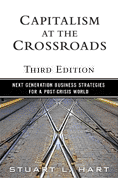While the current economic crisis has been devastating to many in the US and beyond, it could actually turn out to be a blessing in disguise. In a very real sense, the world--and global capitalism-- now stand at a crossroads. New York Times columnist Tom Friedman recently observed that we had perhaps reached the global "inflection point"-- that the growth model we created over the last 50 years is simply unsustainable economically and ecologically and 2008 is when it finally imploded.
Australian sustainability commentator Paul Gilding even had a name for this: "The Great Disruption"--when both Mother Nature and Father Greed hit the wall at the same time. I believe that the significance of the transformation we are experiencing cannot be overstated; companies and other institutions ill-prepared for this new world will simply not survive. The time has come for innovation on a scale that we have never seen before.
It's the natural instinct of governments to pump resources into the economy during such times, but the bailouts and the stimulus packages are in some ways futile efforts to try to restore the world to the way it was. The truth is, we can't. We're witnessing the death of the "Chimerica" consumerist model, where Americans borrow money so they can buy more goods so the Chinese can build more coal-fired plants to make more goods. That model imploded, and I don't think it can come back.
What we're now experiencing is a transformation to a more sustainable form of capitalism--and ultimately, a more sustainable world. This transformation began in the 1990's with the "eco-efficiency" revolution when, for the first time, it became clear that reducing waste, emissions, and pollution can actually save money and lower risk.
In the past decade, two exciting new commercial developments have burst onto the global scene. One revolves around the commercialization of new green technology; the other around better serving and including the poor at the base of the income pyramid. Both are exciting, but the problem is that they have evolved as separate communities. The green techies say, "Just give us the venture capital, and we'll invent the clean tech of tomorrow," as if it will then spring magically into reality.
Proponents of the base of the pyramid approach seek to address poverty and inequity in developing countries through a new form of enterprise. They say, "How do we innovate business models, extend distribution, and become embedded in the community to build viable businesses from the ground up?" But such "pro-poor" business advocates often lose sight of the environment, as if all this new economic activity will automatically create a sustainable form of development at the base of the pyramid. Tragically, that way of thinking could take us all over the cliff, if we end up with 6.7 billion people consuming like Americans.
The challenge of our time, therefore, is to figure out how to bring these two worlds together to enable a global "Green Leap." Indeed, emerging clean technologies, including distributed generation of renewable energy, biofuels, point-of-use water purification, biomaterials, wireless information technology, and sustainable agriculture hold the keys to solving many of the world's global environmental and social challenges.
Because these small-scale green technologies are often "disruptive" in character, the base of the pyramid is an ideal place to focus initial commercialization attention. China's towns and small cities, Brazil's favelas, and India's rural villages present such opportunities. Once established, such technologies can then "trickle up" to the established markets at the top of the pyramid--but not until they have become proven, reliable, affordable, and competitive against the incumbent infrastructure.
In my view, the Green Leap is a key point of leverage in transforming the global economy toward sustainability. If I am right, this holds important implications for policy-making. Rather than circling the wagons and seeking to build a Green Fortress America (or Europe, or Japan), the best thing we could do is get our most promising technologists and entrepreneurs out of the US (and the rest of the developed world markets) and into the rural villages, urban slums, and shantytowns of the world where 4 billion plus people currently reside. It is here that the Green Leap will take place. And, it is here that the corporations of the 21st century will be born.

